Plumbing pipes for sewage: the main types and their
Currently, pipes for plumbing, water supply and sanitation on the market are represented in a wide range. But it is important to understand that a large choice is an obvious advantage, but only if the buyer knows which variety will be the optimal acquisition for the performance of certain works.
In this article we will talk about what are the pipes for the construction of sewage, what materials they are made of and what additional accessories they are completed. So, let's find out what is the classification of sewer pipes in accordance with the material of their manufacture.
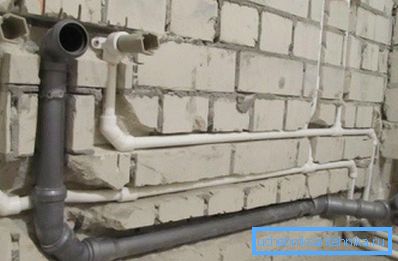
Main varieties
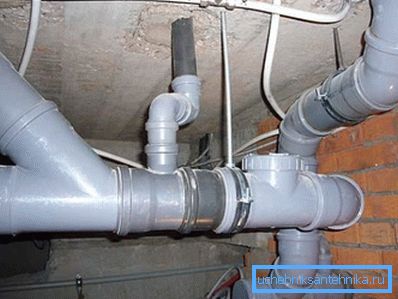
Modern plumbing and sanitary - this is the primary condition for the full functioning of the construction of residential, public and industrial facilities.
Taking into account the different conditions in which sewage pipes are operated, different materials are used for their manufacture, which are characterized by different technical and operational characteristics.
Currently, the following types of pipes are commonly used:
- metal (steel and cast iron);
- polymeric (PVC, PP, PE);
- made of other materials (ceramics, concrete, asbestos cement).
As already mentioned, the listed categories of products are characterized by specific operational and technical properties that determine the scope of their application. Consider the features of these modifications in more detail.
Metal pipes and fittings
Instructions for building sewer systems initially included the use of metal products. Therefore, a metal pipe is a classic solution that has been tested for a long time.
To date, metal products are presented in the following versions:
Cast iron pipes
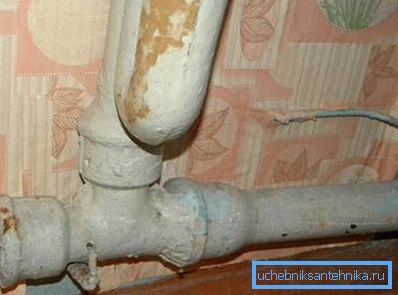
Plumbing products made of cast iron are used in most of the old apartments, as they did not build sewage systems using other materials before. In addition, cast iron sewer pipes were widely used, and to this day are used for the construction of risers in high-rise buildings and for the construction of outdoor sewage.
On the market there are two types of products, namely socket-shaped and socketless modifications. In addition to the design features, these modifications differ from each other in the way they are mounted.
Important: A pipe-less pipeline is an order of magnitude more complicated and requires a professional approach.
Among the advantages of cast iron products we note:
- Strength, not inferior to the same parameters of steel;
- Durability, since the operational life of cast iron pipes can reach 100 years, provided it is used correctly;
- Reasonable price in comparison with the cost of steel analogues;
- Availability of a wide range of sizes and configurations on sale;
- Availability in the sale of a wide range of cast iron fittings and valves.
Are there any disadvantages?
There are several disadvantages:
- The large weight of pipes and related accessories in comparison with other modifications;
- Low resistance to corrosive processes;
- Insufficiently smooth inner surface of the walls, which contributes to sedimentation and the occurrence of blockages in the sewage system;
- The complexity of the installation.
Steel tubes
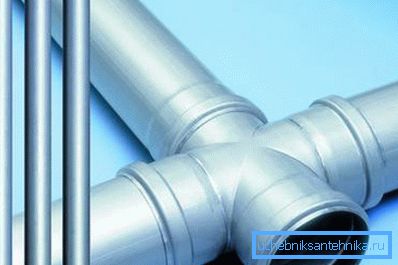
Pipes made of steel are rarely used at the moment due to the high tendency to corrosion and, as a result, their fragility.
Among the advantages of the solution, we note the following:
- Affordable price;
- High resistance to mechanical loads and, as a result, the possibility of laying in unstable soils;
- Resistance to temperature extremes, which makes it possible to operate in regions with harsh climatic conditions;
- Relative simplicity of installation in comparison with pig-iron analogs.
Polymer pipes
Despite the fact that sanitary plastic sewer pipes are a relatively new development, such products are becoming increasingly popular and in demand.
Currently on the market there are three main polymer modifications that differ from each other used in the manufacture of the material.
PVC pipes

Components for the assembly of sewage systems made with the use of PVC polyvinyl chloride can be purchased at almost every specialty store. Whether it is a sanitary sewer tee 110 or a knee made of plastic, you can certainly buy a plastic product at an affordable price.
Such products are especially popular in the process of assembling domestic sewer systems or house risers.
And this is not surprising, since PVC pipes are characterized by such advantages as:
- Low weight;
- Ease of machining and installation;
- Long operational resource, up to 50 years;
- Ideally smooth inner surface of the walls, which eliminates the formation of deposits as in the case of cast-iron analogs, and, as a result, reduces the likelihood of clogging;
- Reasonable price even in comparison with the cost of steel pipes;
- High degree of strength and, as a consequence, the possibility of laying in the ground or in cement screeds without the need for special reinforcement;
- Resistance to UV radiation when laying outside.
Among the shortcomings we note:
- The probability of deformation and reduce the degree of strength during transportation through pipes of liquid media with a temperature above +70? С.
- Low resistance to low ambient temperatures, which leads to a decrease in strength characteristics.
- Low resistance to organic solvents.
- The release of phosgene (toxic gas) during combustion.
Important: PVC pipes emit noise when water flows, which is especially felt when they are laid externally. It is possible to increase the degree of noise insulation using special insulating materials based on mineral wool or foamed polyester.
Polypropylene pipes
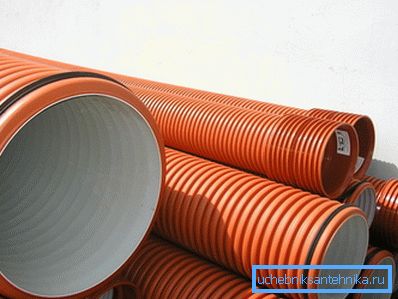
Elements of sewage systems made with the use of polypropylene (PP) are operated mainly indoors. To provide additional strength, such pipes are equipped with stiffeners.
Among the distinctive qualities of these pipes we note:
- Low weight;
- High degree of elasticity even in comparison with polyvinyl chloride analogues;
- Resistance to sudden temperature changes;
- The possibility of operation in regions with harsh climatic conditions;
- The possibility of operation in pressure sewage systems;
- Easy installation due to elasticity and flexibility.
Polyethylene pipes
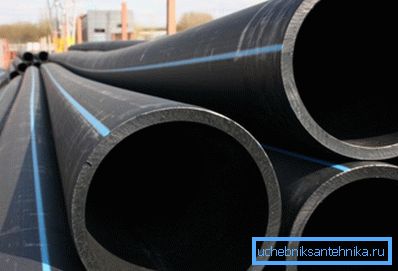
Plumbing plastic sewer hardware pipes and related accessories made of polyethylene are the most flexible.
The flexibility of the polyethylene sewage system allows it to maintain its integrity even after the liquid in them completely freezes. After the ice block melts, the pipe will take on its original shape without cracking.
Plumbing products from other materials
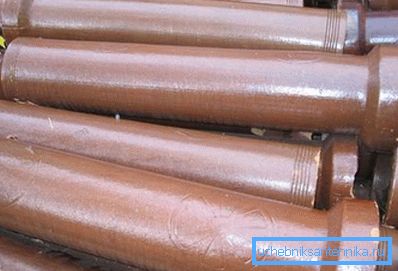
Building a sewage system with your own hands can be done not only with the use of metal or polymer components. For example, ceramic concrete and asbestos cement pipes can be used.
Consider the main characteristics of these products.
- Ceramic pipes used in the installation of industrial, domestic and storm sewers with external location. The advantage of ceramic structures is durability and resistance to abrasion of the inner walls. Therefore, the internal cavity of the pipe for a long time remains smooth.
- Concrete pipes used in the construction of sewer lines with a large cross-sectional diameter. The only significant drawback of such structures is the complexity of installation, due to the use of lifting machinery.
- Asbestos cement pipes universal solution for sewer lines. Such products are many times cheaper than cast-iron analogs. A significant drawback is the fragility and, as a result, the instability to point shocks.
Conclusion
Now you know what sewage pipes are made of, what are the advantages and disadvantages of certain modifications and for what purposes they are used. If you have any questions, you can find more useful information by watching the video in this article.